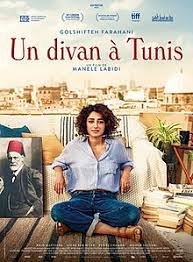
ARAB BLUES/ UN DIVAN A TUNIS
France/Tunisia, 2019, 88 minutes, Colour.
Golshifteh Farahani, Majd Mastoura.
Directed by Manele Labidi.
The English title refers to the population of Tunisia, Arab background, Muslim background, but all the personal and psychological problems. The French title uses divan – but the English title could be divan or sofa, but, more particularly, couch because of the psychoanalysis scenes.
Central character is Selma, born in Tunisia, parents exiled, growing up in France, training to be a psychologist, returning home, wanting to set up a practice. She uses the roof of a building owned by her relatives who do not necessarily approve, although their daughter is very friendly with Selma.
Selma goes to a headdresser and advertises her practice – and, very surprisingly to her and the audience, there are long queues. In fact, rather than long psychoanalysis sessions, there are quite a few clients and episodic moments, revealing characters and problems, some a touch funny, some very serious. The only long conversation occurs with an elderly man in the building who has felt alienated from the authorities at the local mosque.
The other central character is the local policeman, holding up Selma’s rickety truck, abiding by the letter of the law, warning her that she could go to prison without a license, yet attracted to her personally. A lot of to-ing and fro-ing. There are also the frustrating visits to the authorities in order to get a permit.
There are also Selma’s own problems, returning home, the practice, the law, the interactions – and the film does offer a lot of critique of bureaucratic behaviour in Tunisia, eccentricities as well as the perennial problems.
A short film, rather slight, it has its entertaining moments.
- The title, the divan, the psychology couch, the focus of Tunis? The English title and psychology problems?
- Tunisia, the city setting, homes and apartments, apartment blocks, the streets, the shops, police precincts, government offices, the trip to the country to see the grandfather, the open spaces, the beach sequences? The musical score?
- Selma’s story, born in Tunisia, her parents and exile, aged 10, growing up in France, training as a psychoanalyst? The street crowded with psychoanalysts? Her return, her hopes?
- Her personality, age, living alone, strong-minded, continually smoking? Reuniting with her relatives, their disapproval? The daughter, her problems (education, red hair, wanting to break out, the planned marriage with the gay man, its failure, her travels with Selma)? The background of the relations, the father and his drinking, the later revelations about his frustration, the mother and her frustrations (and her daughter hiding behind the divan)? Some reconciliation?
- The manager and her style, the advertisement, the long line, the range of clients, the glimpses of sessions, some serious, some farcical, the range of problems? Talking, Selma listening, the strictness on time, on payments? And later revealed her payments in all kinds of food and goods?
- The buying of the truck, held up by the police, the chief, the breath test, the later encounters, his abiding by the rules of the law, her having to have a license, the threat of prison, yet asking her out? His two assistants and their continually intervening, interrogations, suspicions and false accusations? Selma and her plea for the compassion for the clients with their problems?
- The visits to the office, the chatty woman, trying to sell goods, enjoying the ? interactions The bureaucracy, the delays? Going to visit her grandfather, his old age, living in the past? The truck, the breakdown, the driver picking them up, listening, her story?
- Eventually wanting to leave, the harassment from the two police? The rescue by the Chief? Her going to the office, finding the documents?
- The range of clients, the hairdresser, the cross-dresser, the paranoid about Mossad, the mother with the clinging son…? The old man, the mosque, wounding himself, the long talk?
- Selma, her work in the truck, her setting up her practice, going to the beach, the police chief, imagining the future?
- The sympathy for ordinary people, their problems, the need to find someone who will listen to them attentively and sympathetically?